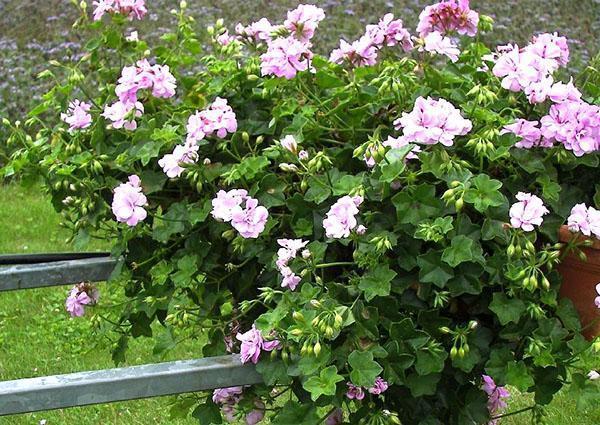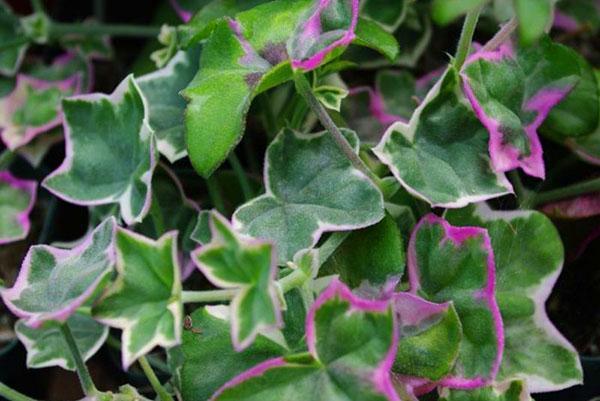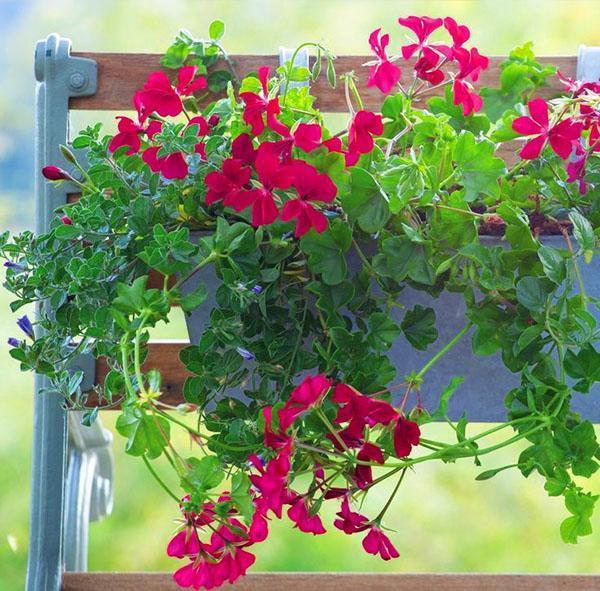Features of care and cultivation of ampelous geranium at home
 Pelargoniums or indoor geraniums are loved all over the world for their docile, non-capricious disposition and brightness of flowering. But along with the common bush forms, ampelous geranium - or thyroid or ivy-leaved pelargonium - is increasingly used for vertical gardening, decorating flowerpots and hanging pots.
Pelargoniums or indoor geraniums are loved all over the world for their docile, non-capricious disposition and brightness of flowering. But along with the common bush forms, ampelous geranium - or thyroid or ivy-leaved pelargonium - is increasingly used for vertical gardening, decorating flowerpots and hanging pots.
The Pelargonium peltatum species is distinguished not only by the ability to form graceful, but quite strong cascading shoots up to a meter long. A characteristic feature of this variety of indoor geranium is dense five-toed leaves of an even green or variegated color. see also photo of oleander flower!

Conditions for growing ampelous geranium at home
Ampel forms of ivy geranium feel good in lighted places, where the plants are not threatened by drafts or cold gusts of wind. If in the summer it is supposed to take out pelargonium in the open air, in the spring it is better to harden the plants, gradually accustoming them to outdoor content and increasingly taking them out to the balcony or terrace.
Hardened specimens can tolerate significant temperature drops. But if the thermometer drops below zero, damage to the tops of the shoots or more serious harm cannot be avoided.
Since ampelous geraniums in nature are plants of mountainous regions, they are most often undemanding to the composition of the soil. Better if:
- pets are planted in a fertile substrate with the addition of a small amount of clay;
- a powerful drainage layer is made at the bottom of the pot.
 When caring for ampelous geraniums, they provide a regular, but moderate watering... Excessive moistening of the soil under the lush falling crown of the plant threatens to disrupt the aeration of the soil, rotting roots and the death of pelargonium.
When caring for ampelous geraniums, they provide a regular, but moderate watering... Excessive moistening of the soil under the lush falling crown of the plant threatens to disrupt the aeration of the soil, rotting roots and the death of pelargonium.
Summer care for ampelous geraniums at home
 During the period of active growth, lasting from March to the end of August, the ampelous variety of indoor geranium needs regular feeding.
During the period of active growth, lasting from March to the end of August, the ampelous variety of indoor geranium needs regular feeding.
With constant care, ampelous geranium at home responds well to weekly application complex fertilizer.
How to feed geraniums so that it blooms for a long time and abundantly throughout the season? If in the spring of pelargonium for better growth it is possible to give funds containing a significant amount of nitrogen, from the second or third feeding it is better to limit geranium in this element. Otherwise, the grower will admire the large dense leaves all season, but the flowering will be either very weak, or the buds will not appear at all.
As they grow, when the roots completely inhabit the volume of the pot allocated to them, the plants are transplanted.
Ampel geranium at any age tolerates this procedure without loss, the main thing is not to choose the next container much larger than the previous container. Until the roots unfold to its full extent, pelargonium will not honor the owner with bright caps of flowers.
 In the warm season, caring for ampelous geraniums consists of:
In the warm season, caring for ampelous geraniums consists of:
- from irrigation carried out when the upper layer of the substrate dries out;
- from dressings, combined with moistening the soil under the plant;
- from the obligatory pruning and pinching of shoots.
How to pinch geraniums so that the middle of the crown does not expose the plant, and the lower shoots form beautiful cascades? In bush species in spring and especially in autumn, a fairly deep crown pruning is performed. This allows you to give the bush a compact shape and achieve lush flowering in the coming season.
The attractiveness of the ampelous geranium is not only in the inflorescences, but also in the long shoots "flowing" downward. Therefore, only the already bare or drying stems are pruned, and the rest try to pinch gently.
This technique causes:
- branching due to the awakening of dormant buds;
- the formation of more inflorescences on new stems.
 As a result, the top of the crown does not "go bald", and the flowering spreads to the entire plant, which turns into a bright colored ball.
As a result, the top of the crown does not "go bald", and the flowering spreads to the entire plant, which turns into a bright colored ball.
Caring for ampelous geraniums in the winter
For wintering ampel geraniums, you need:
- a cool place where the temperature is kept between 5-12 ° C;
- scattered but quite bright lighting;
- rare watering that does not affect foliage and shoots.
 If the plants lack light, by the spring a mass of weak, stems with crushed pale leaves will form on them. And the excess moisture when caring for ampel geraniums in winter is a sure reason for decay of the root collar and peripheral roots.
If the plants lack light, by the spring a mass of weak, stems with crushed pale leaves will form on them. And the excess moisture when caring for ampel geraniums in winter is a sure reason for decay of the root collar and peripheral roots.
In addition to observing the temperature and humidity conditions, providing light, ivy-leaved pelargoniums need to remove old foliage. It is better to do this with scissors so as not to damage the buds in the leaf axils.
Growing geraniums from seeds
You can propagate the ampelous geranium of the variety you like using seeds or vegetatively, by cuttings. The first method will require a lot of labor, but it is irreplaceable when it comes to obtaining new hybrids or the lack of the desired cuttings.
 Growing geraniums from seeds can be carried out from December to the last days of April. True, in the winter time you cannot do without the use of specialized illumination of seedlings:
Growing geraniums from seeds can be carried out from December to the last days of April. True, in the winter time you cannot do without the use of specialized illumination of seedlings:
- Seeds 3-5 mm are embedded in a mixture of peat, sand, garden soil and sphagnum.
- A container with a moist substrate is placed in a mini-greenhouse or under a film, where a constant temperature, air and soil humidity are maintained.
- With good lighting and a temperature of 22-24 ° C, seeds will sprout in 7-10 days.
- After 3 weeks, the grown plants are picked.
The procedure stimulates the growth of seedlings, and from this moment they are fed with a complex agent for ornamental crops. And when several true leaves appear, young ampelous geraniums are planted in their own pots.
Propagation of ampelous geranium by cuttings
 You can get healthy, fully transmitting the characteristics of the mother plants ampel geraniums using cuttings. They are cut from mature bushes at the end of summer, when mass flowering is completed and pruning is carried out pelargonium... If green pets gave a good, strong growth in winter, then spring cuttings can be easily rooted.
You can get healthy, fully transmitting the characteristics of the mother plants ampel geraniums using cuttings. They are cut from mature bushes at the end of summer, when mass flowering is completed and pruning is carried out pelargonium... If green pets gave a good, strong growth in winter, then spring cuttings can be easily rooted.
But it is important to remember that, unlike zoned pelargoniums, ivy varieties do not behave well in water. They easily rot, so it is required to root the cuttings in the soil from peat, sand and a small amount of humus.
 Saplings 7–12 cm long with several own leaves:
Saplings 7–12 cm long with several own leaves:
- within 2 - 6 hours air-dried;
- treated with crushed charcoal or activated carbon;
- planted at a short distance from each other along the edge of a container or pot.
Young ampel geraniums do not need greenhouse conditions for rooting. They give their own roots about three weeks after being cut from the mother bush.
After the formation of several leaves, a pinch is carried out, stimulating branching.With good care, ampelous geranium blooms at home after the first wintering and then for many years pleases the owner with a green crown and lush caps of inflorescences.